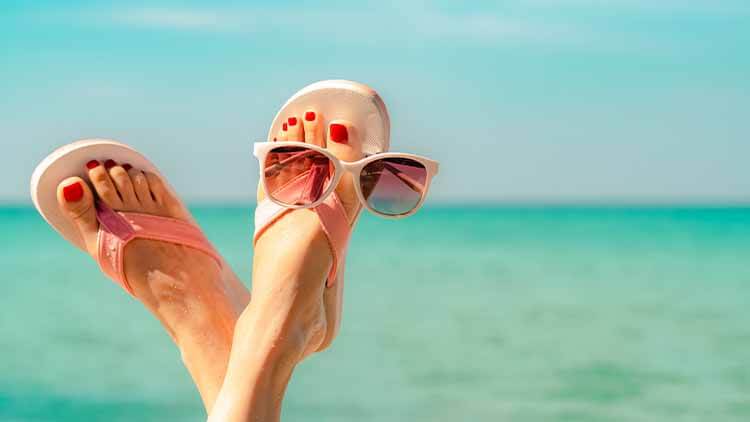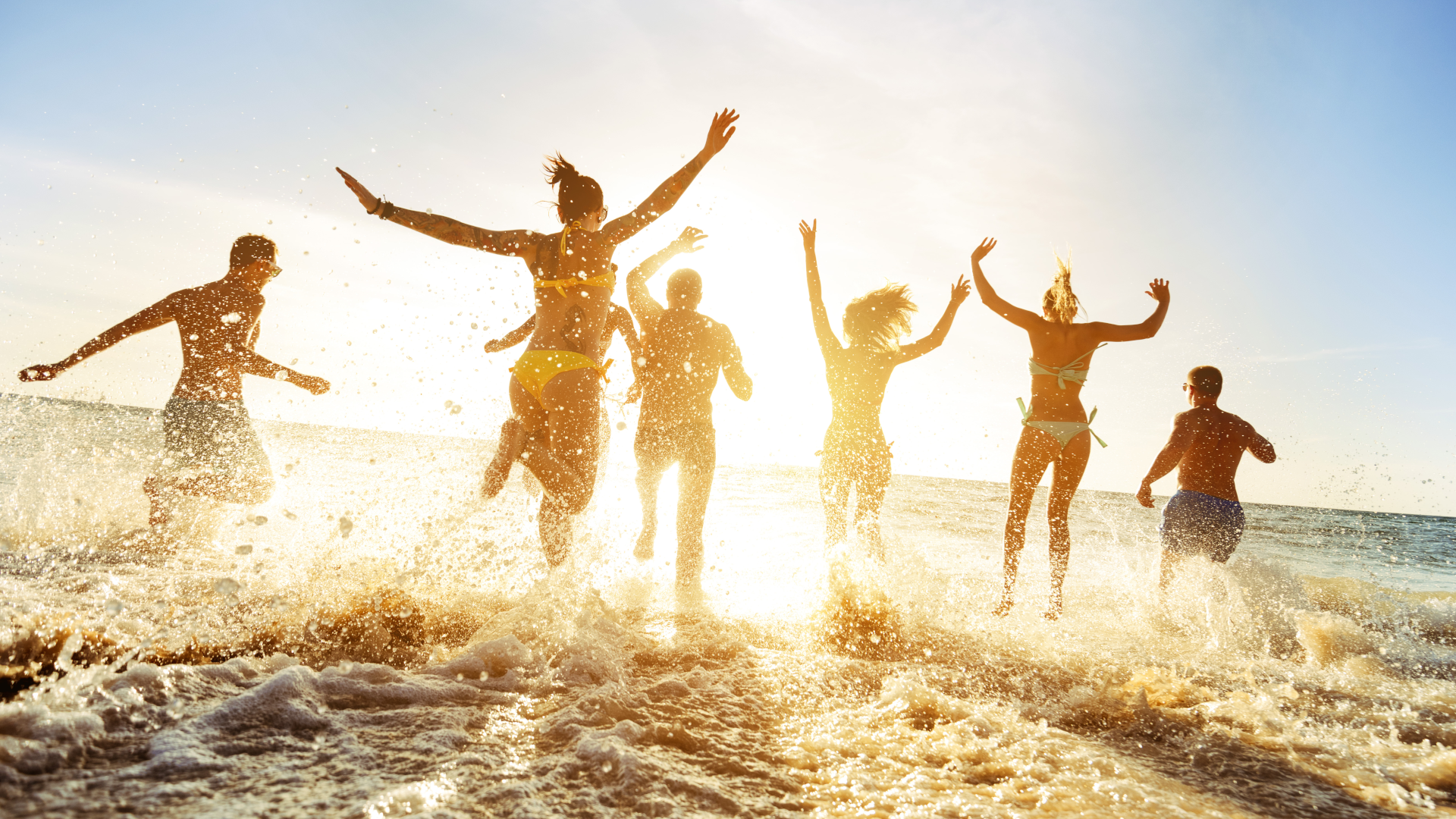When on vacation and far from the gym, many people worry about vacation weight gain. For the most part, you won’t really gain a lot of weight when you’re on vacation; even gaining a pound is an unlikely scenario. However, if you feel really sensitive to weight gain and can’t bear the thought of living a little unhealthy for a week, then we can help out.
This blog will speak of how to achieve weight loss even on a vacation, how much weight you can actually gain in the time, and how to get rid of vacation weight once you’re home. By the end of it, you will know exactly how you should plan your vacations to minimize weight gain and how to get back in shape once you’re back.
- Should you be concerned about vacation weight gain?
- How much weight can you gain in a week-long vacation?
- How to lose weight on vacation
- How to lose weight after vacation

Should You Be Concerned About Vacation Weight Gain?
Most people, especially if they’re really committed to maintaining a healthy weight, really worry about weight gain on vacations.
The idea of taking a week off from the gym and all the opportunities to splurge can be daunting because these present the possibility of losing all the progress you’ve made losing weight before the vacation. There’s no definite way to answer these questions because these fears have little truth to them and might also be a little exaggerated.
When you’re on vacation, the thought of going to the gym doesn’t really cross your mind. After all, you are on vacation and it’s really easy to get carried away relaxing, to forget your well maintained calorie counts and diet.
The health risks presented by binge eating never go away and it’s possible that you gain a few pounds over the course of your vacation. As with all things, discipline and commitment is the key to weight maintenance and you don’t necessarily have to work out to lose weight.
The only way to maintain and lose weight is to make sure that you maintain consistent calorie intake and deficits respectively. As such, if you watch what you eat you will maintain or lose weight even if you don’t work out.
Whether or not you’ll gain weight depends on how strictly you maintain your calorie intake even when you’re on vacation. You’re always in control of your weight and the circumstances don’t really have much to do with it.

How Much Weight Can You Gain In A Week-Long Vacation?
Weight gain and weight loss is achieved by maintaining the right calorie balances. Contrary to popular belief, calories are a measurement of the energy you need to function throughout the day and not the amount of fat in foods.
If you’re eating food that contains more energy than you can use, then you’ll gain weight; if you’re eating food that contains less energy than you need to function, you’ll lose weight. Leftover calories that aren’t immediately needed by the body are stored as fat, which is responsible for weight gain.
If you’re eating food with less energy than that needed for everyday functioning then the body begins burning fat to make-up for the energy and/or calorie deficits. The amount of weight you will gain during a week-long vacation depends on how many calories you eat and how much you use up throughout the time.
Before we can explain how much weight you can gain during a week-long vacation, we’ll need to discuss some basic calorie concepts. These are:
- Maintenance Calories – The amount of calories you need to take for a week to maintain your weight.
- Calorie Deficit – This is the amount of calories short of meeting your maintenance calorie levels.
- Calorie Excess – This is the amount of calories that you consume over your maintenance calorie levels.

Each pound of body fat contains 3,500 calories. If your maintenance calorie levels are at 22,000 calories per week, then you’ll need to eat an excess of 3,500 calories in addition to the maintenance calories to gain one pound of weight. In this situation, if your vacation week calorie count was 25,500 calories, then you’ll gain one pound of weight.
Similarly, if you eat 3,500 calories less than the maintenance calorie level of 22,000, then you’ll lose one pound of fat. As such, if your calorie intake was 18,500 calories during the vacation week; you’ll find that you’ve actually lost a pound during the vacation.
When you break this down into the daily calorie consumption, eating 500 calories over your maintenance calorie level will have you gain one pound in weight.
As we said before, weight loss and maintenance is all about maintaining the right calorie balance. This can go two ways; either you eat 500 calories less than the maintenance calorie level or you can also increase the amount of calories you burn through your workouts.
For one thing, it’s unlikely you’ll eat 500 calories more than your usual intake on your vacation unless you go on a complete binge and for another it’s pretty easy to lose this weight if you mix exercise with your vacation.
By exercise we don’t mean that you find a gym on your holiday, but you can try out swimming, cycling, or going for regular walks to minimize your weight gain. This exercise will increase the calories you’ll burn everyday in addition to the calories you will eat and a balance will be achieved.
Once you mix up the habit of eating larger portions during the vacation with more exercise; you’ll end up balancing your calorie intake and use to maintain your weight.
You can use these figures to assess the amount of weight you gain or lose throughout the vacation. A 7,000 calorie intake will have you gain 2 pounds and 7,000 calories lost or burned in excess will have you lose weight on the vacation.

Vacation Weight Is Mostly Water Weight
Most of the weight gained on your vacation is going to be water weight. When you come back home, you’ll realize that you’ve gained a bit of weight, which is largely going to be water weight, and this can be easily lost.
Interestingly enough, carbohydrates are responsible for much of the water weight in the body so you might want to watch how many carbohydrates you take during the vacation. Each gram of carbohydrate can retain up to 3 grams of water and add to your overall body weight.
If you’re wondering how to not gain weight on a vacation, then cutting down on carbohydrates is a surefire way of preventing weight gain. Although all you need to do is sweat more to lose the water weight; it’s essential that you prevent retaining more water in the body than is necessary to maintain your weight goals.
Furthermore, if you’re on vacation and maintain a steady calorie intake without fewer than you will have solved the question of how to lose weight on a vacation. We’ll discuss this in greater detail in the next section.
How To Lose Weight On Vacation
Even though you’re on vacation, that doesn’t mean you can continue working on your weight loss while you relax. It’s surprisingly easy to lose weight and it won’t necessarily ruin the vacation experience if you do keep up with your weight-loss regimens.
Honestly, you’ll actually feel a lot better as you get both a tan and the body that you’ve always wanted on a vacation. When you get back to your everyday life, you’ll look great with the added bonus of being healthier after vacation than before it.
So if you’re on vacation and don’t want to wait till you get home to lose weight or give up on your weight loss progress then here are some tips you should consider.
Try To Eat More Healthily
Even if you’re on vacation, it doesn’t mean that you should give up on your diet. Even if you should be relaxing, binging on junk and fast food presents many other health risks than just weight gain.
Therefore, you should look for restaurants where they would serve you healthy foods and preferably stay in places with a kitchen so you can make requests for low calorie foods.
So when you’re on vacation you might want to take the following steps:
- Keep carbohydrate intakes low to prevent water weight.
- Switch to proteins like those found in vegetables, these have lower calorie counts.
- Eat more fruits to keep yourself energized and meet your daily vitamin requirements.
- Try to keep your sugar consumption balanced and not have too many sweet foods.
- Drink plenty of water.
- Substitute processed foods with protein instead.

Portion Control
As mentioned before, calorie balances are the only way to lose weight fast. If you’re finding it difficult to cut down on the carbs or can’t find enough fruits and vegetables, then you should keep your portion sizes low.
Beyond the type of nutrients you’re consuming, binge-eating is the leading cause of weight gain during a vacation. As such, portion size control takes center-stage when you try to lose weight or maintain it on your vacation.
Get Some Exercise
Getting exercise is the best way to lose weight since it helps you increase calorie consumption throughout the day. If you have a gym in your hotel, then you could log in a few hours to work up some sweat.
If there isn’t a gym then you’ll find plenty of opportunities to go for a walk, jog, or even swimming. Think of ways that you can exercise while you’re on vacation such that it is enjoyable and healthy at the same time and you should have no trouble keeping up with your workout routines.
How To Lose Weight After Vacation
Once you’re back from vacation, if you’ve gained weight, it’ll make you go into fitness and workout overdrive.
Do not panic, this weight can be easily lost with some minor changes to your diet and continuing with your workouts.
Making sure that you inculcate healthy habits like walking, portion sizes enough to allow for weight loss, and maintaining a low weight diet is the only answer to the question of how to lose weight after a vacation.
We cannot emphasize enough the role of low calorie diets and of reducing your carbohydrate consumption in the process of losing weight. As such, some strategies to lose weight after vacation quickly are:
Eat Strictly At Home
Do not eat out immediately after you’ve come back from vacation because you’ll have food with high calorie counts and fat content. Instead, change up your grocery list to buy foods that can help you lose weight like lentils, vegetables, fresh fruits, and lean protein.
Additionally, you should also get rid of any fattening foods from your refrigerators to minimize the risk of increasing carbohydrate and fat intake. With a low-fat, high-protein diet you can eat to your heart’s content and still not consume as many calories even though you might not reduce your portion sizes.
Take All Opportunities to Get Exercise
Exercising doesn’t always mean that you go to the gym or run for a mile every day. You can make minor adjustments to your lifestyles to get yourself to expend more energy than you would usually.
This includes taking the stairs to your office more often or going for an extra walk after dinner to cut some calories extra.

Drink More Water At Work and Eat More Fruits
It has been observed that people get hungry less often if they drink more water. Whenever you’re at work, make sure that you keep up with your water intake and not order in lunch. Set a specific lunchtime and snack on fruits if you feel a craving kick in.
Conclusion
Gaining weight on vacation is very common. Enjoying your vacation sometimes means that you can relax a little and not hold yourself accountable for every little slip up. With some care, you can enjoy your vacations while maintaining your weight.
This blog has provided a complete guide to achieve weight loss on vacation and how to overcome vacation weight gain. It’s not really difficult to lose weight for as long as you have a plan and you stick to it.
Always remember, weight gain isn’t always a problem all it takes is some commitment to your long-term health.
Check also our Summer Slim Down Guide




